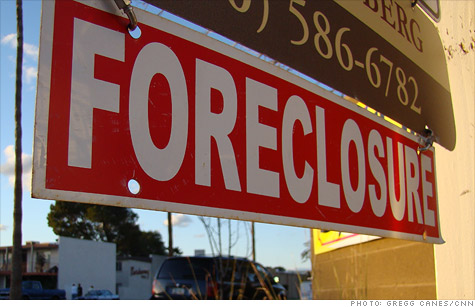Mortgage deal means more foreclosures

Experts say many foreclosures that were on hold during the deal negotiations will now proceed.
NEW YORK (CNNMoney) -- Even as the $26 billion mortgage settlement helps hundreds of thousands of troubled homeowners, it will bring a wave of new foreclosures.
Many lenders held off on reposessing homes during the complex negotiations between 49 state attorneys general, and federal officials.
That's left a backlog of troubled loans, many of which won't be helped by measures in the deal that will let homeowners refinance or reduce the amount of their mortgage.
"The bottom line is that 2012 will see a lot of foreclosures that should have taken place in 2011 and didn't," said Rick Sharga, executive vice president for Carrington Holdings, a real estate finance firm.
Daren Blomquist, vice president of RealtyTrac, online marketer of foreclosed properties, agrees that much of last year's 34% drop in foreclosure filings was likely due to the uncertainty involved in the negotiations. He estimates that new filings will climb from 1.9 million in 2011 to between 2.2 million and 2.5 million this year.
"We think what we saw in 2011 was artificially low foreclosure numbers," he said. He added that banks took longer to file foreclosure notices last year, and longer to finish the foreclosure process.
Banks pay homeowners to sell
HUD press secretary Derrick Plummer said Thursday's mortgage settlement is designed to make foreclosure the last resort for banks negotiating with homeowners who are seriously delinquent on loans.
Sharga and Blomquist agree said that the mortgage deal will help many homeowners stay in their homes who would have otherwise been forced out. Up to one million mortgage holders could see the amount of money they owe reduced.
But the solutions offered by the settlement can only work for homeowners who can afford to make new, lower mortgage payments. Banks will have little choice to foreclose on those who have stopped paying due to prolonged unemployment or other severe economic distress.
"The settlement really wasn't designed to prevent foreclosure on loans that aren't salvageable," said Sharga.
Banks have been letting delinquent loans sit in limbo, but now that a settlement has been reached, banks will likely start contacting delinquent homeowners to see which loans can be salvaged. Sharga says that the banks will likely turn up a raft of new foreclosures.
The five lenders who are parties to the deal -- Bank of America (BAC,Fortune 500), Citigroup (C, Fortune 500), JPMorgan Chase (JPM,Fortune 500), Wells Fargo (WFC, Fortune 500) and Ally Financial -- together account for about 60% of the mortgage market, Sharga said. And there are many other lenders who were also taking a wait-and-see approach while the big banks held talks, who might soon join the settlement as well.
Sharga and Blomquist said that while the increase in foreclosures will cause plenty of pain in the short term, it's an important part of the recovery process for the housing market, especially the hardest-hit markets.
"The uncertainty has been very bad for the market over the last year," said Blomquist.
There are currently more than 3 million homeowners either seriously delinquent on mortgages or in foreclosure, and that looming inventory has been one of the biggest drags on home sales prices.
"The market needs to clear out a lot of the distressed inventory before prices start to come back," Sharga said.

No comments:
Post a Comment